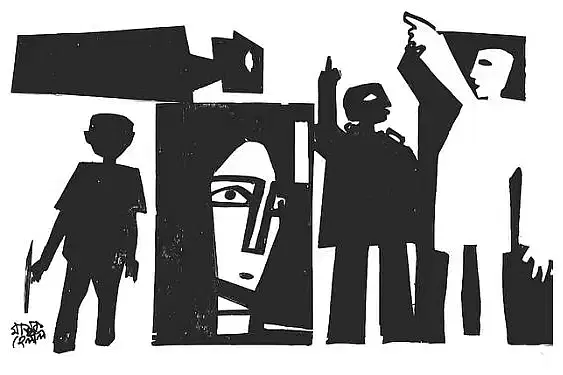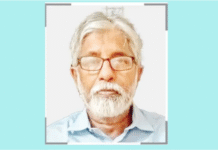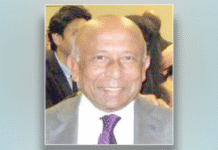
Sohrab Hassan
When asked about the state of affairs in the country, a non-partisan political analyst remarked that when the interim government headed by Dr Muhammad Yunus was formed after the July-August mass uprising, it has massive support of the people. But just within five and a half months that popularity has waned and various apprehensions cropped up in the public mind.
Before 5 August, the autocratic government had been the common enemy of the demonstrating students and the political parties. After that government was toppled by means of the student-mass uprising, the people had hoped that the interim government would run the country efficiently with the support and cooperation of all those who had been involved in the movement. Or at least they would focus on resolving the basic problems of the people. But that has not quite happened.
Presently there has been a bickering between the BNP leadership and several of the advisor student leaders over the election, and the lack of confidence of the concerned quarters in the government has a lot to do with this. Had the government been able to function well and people would find some respite, then the political parties would not be in such a hurry for the election. As the government has been retracting one decision after the other, it is not being able to garner confidence. Again, there are those who feel the government will acquiesce to any demand under a little pressure.
With VAT being increased on over 100 items in the middle of the financial year, business quarters and others protested, though policymakers said this will not have much of an impact on the market. But when it did actually have an impact, the government was forced to withdraw the additional VAT from some products. It was the same in the case of dearness allowance for the government service holders. According Samakal reports, the government has moved away from its decision to increase dearness allowance. This may be added in the budget of the coming fiscal.
On Friday, Ajker Kagoj reported the central bank had moved away from his stern message, saying that now the decision to declare a loan to be defaulted after 90 days will come into effect in July. It was supposed to have come into effect in April.
In a recent interview with BBC Bangladesh, BNP secretary general Mirza Fakhrul Islam Alamgir commented that if the interim government failed to maintain its neutrality, another government would be needed to hold the election. His comment caused a stir in political circles. It is fine if the students who led the July uprising form a new political party, however the other political parties will not accept it if they contest in the election with representatives remaining in the government, the BNP secretary general said.
After this statement, information advisor Nahid Islam wrote in his verified Facebook page that the BNP secretary general’s statement was indicative of another 1/11 government. While BNP had been talking about ‘minus-two’ only recently, it was now proposing another 1/11 in the name of a neutral government. BNP had been the main target of 1/11. So it is hardly plausible that they would want another 1/11. On the contrary, they contend that various quarters are using the state power in an attempt to keep them away from power.
it is only natural for the BNP secretary general to raise questions if anyone on the interim government shows an interest to form a political party. There is no scope for misunderstanding over this. The government should make its stand clear
Saying that there has been a plan to minus the students and leaders of the uprising since 5 August, Nahid Islam said, “From 3 August we had been saying we will not accept any type of military rule or state of emergency. We were repeatedly asked to go to the cantonment, but we refused. Finally the discussions and bargaining took place in Bangabhaban and the decision was taken to form the interim government with Professor Yunus as the head.”
Advisor Asif Mahmud, Jatiya Nagorik Committee’s chief coordinator Sarjis Alam and convener of the Students against Discrimination movement Hasnat Abdullah also replied to the BNP secretary general’s statement.
Asif Mahmud wrote, “If anyone of the advisors contests in the election, they will leave the government to do so.” He also said that political parties should not interfere in government work. The question naturally arises, who is interfering? And why is the government accepting it? Is there any invisible government within the government?
Two aims of the student-mass uprising was the fall of Sheikh Hasina’s government and a move on to democracy. There was no problem with the former. Left, right and centre were all in unison on this point. The problems are arising on the matter of moving on to democracy. The BNP leaders oppose any proposal put forward by the student leaders. And the students leaders, in turn, do not take BNP’s proposals well either.
BNP and other political parties have been in a movement for one decade (2014-2014) against elections under a party government. So it is only natural for the BNP secretary general to raise questions if anyone on the interim government shows an interest to form a political party. There is no scope for misunderstanding over this. The government should make its stand clear. The interim government was to come up with an ordinance, taking a decision on principal that no one on this government would contest in the next election and after holding a free and fair election, they would hand over power to the elected government. But that ordinance was eventually never enacted, giving rise to apprehensions.
The debate which arose over a new political party would have ended with advisor Asif Mahmud’s response to the BNP secretary general’s contention. But the additional comments made by him and his associates are a matter of concern. He spoke about the interference of political parties in government work. Nahid Islam even said that all sides have partnership in the government and all sides are enjoying various benefits.
By “all sides” does he mean BNP, Jamaat and the student leaders? A large part of the movement was the working class. They have not demanded their share of the victory from the government. The government hasn’t even been able to finalise the list of the martyrs and those injured in the movement as yet.
Every citizen in a democratic society has the right to express their views and form a party. But the question has arisen of the party’s link and involvement with the state or administration machinery.
The student leaders feel that the old politics failed to meet the people’s aspirations. That is why they have taken initiative to form a new party. There is nothing for BNP and other political parties to be concerned about. Everyone will take their respective plans and programmes to the people. It is the people who will decide who they will elect and who will form the government.
prothom alo









